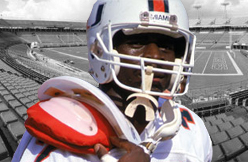Former Dallas Cowboys football player Michael Irvin has denied all allegations in a lawsuit filed by three people who claim he stole their idea for a reality TV show about unknowns trying out for a professional football team.
Irvin denies that any contract existed between him and the plaintiffs and also filed a counterclaim in the case.
Irvin accuses the plaintiffs of defamation and slander, civil extortion and duress, tortious interference with current and prospective business relations and civil conspiracy, among other causes of action.
About a month ago, the original plaintiffs Jordan Bealmear of Thermal, Calif., and Shannon Clark and Christopher Harding, both of Louisville, Ky., alleged Michael Irvin’s reality show “Fourth and Long” was their idea, but one that had been intercepted by Irvin during negotiations to work together on the program.
The plaintiffs in Irvin’s response also are referred to as The Bealmear Group. Irvin’s court filing accuses The Bealmear Group of fraudulently representing themselves as producers who had the appropriate connections and know-how to put such a show together. Irvin also accuses the group of defaming him when he decided not to pursue further communications with them.
The plaintiffs, in a lawsuit filed in Dallas County earlier this year, accused Irvin of fraud, fraud by nondisclosure, breach of contract and unjust enrichment.
However, in a response to the suit filed late last week, Irvin says he had the idea to produce an "American Idol”-type reality show about football try-outs years before he met the plaintiffs. The counterclaim filed by Irvin also contends that Irvin told his attorney about the idea before meeting any of the plaintiffs.
In Irvin’s response, he alleges that a friend of his, Bonnie-Jill Laflin, knew of Irvin’s interest in producing such a show and connected him with one of the defendants Shannon Clark who also had mentioned creating a show with a similar concept.
Irvin says without the friendship with Laflin, the plaintiffs never would have been able to secure a meeting with him. In addition, Irvin said he told Laflin he would meet with the group, but already had the idea for the program and did not make a commitment to them at any time. His filing also states that the meeting wasn't exclusive and that Irvin had meetings with others, including former Cowboys Coach Barry Switzer, about doing a TV show.
Irvin also said he learned the group “had nothing to offer” and the show discussed was not based on proprietary information, but rather on a common business plan that many in the entertainment industry were pursuing after the success of American Idol-type reality shows, according to court documents
“After being rejected for this project by Irvin, the Bealmear Group, in much the same manner as one would expect of a spurned lover, or a spoiled child, began and continues to wage a campaign to publish false, misleading and/or defamatory remarks about Irvin, his reputation and his methods and manner of doing business," alleges the suit, filed on Irvin's behalf by Dallas attorney Larry Friedman.
The plaintiffs in the original lawsuit claimed they developed the concept behind the show, which they were calling “Guts to Glory” and ended up in contact with Irvin and his representatives to invite Irvin to be the show’s host.
The plaintiffs said they offered a deal in which Irvin and his agent would receive 25 percent of the proceeds and the plaintiffs would receive 75 percent. They later struck a deal in which Irvin would take 75 percent of the aggregate executive producing fee, while the plaintiffs would share the remaining 25 percent and that adaptions of the show for other sports would involve a 50-50 split, according to the lawsuit.
During the negotiation process, the three say Irvin was provided with marketing tools, including a story board, to present to Dallas Cowboys executives and Dallas Cowboys Coach Jerry Jones with the intent of getting the team involved.
In the lawsuit, the plaintiffs said they were escorted out of a March 10, 2008, deal signing meeting at the Dallas law offices of Friedman & Fiegler LLP in which Larry Friedman was present. Their attorney, Larry Kopeikin, was attending the meeting via a conference call. When they were brought back into the meeting, the plaintiffs were told that Irvin would have to review the deal memo before signing.
Days later, they learned that Irvin would only agree to a 95-5 percent split with Irvin taking a 95 percent cut, and five days after that Irvin sent an e-mail to Clark stating that he had never used the storyboard in his presentation to Jones, according to the lawsuit.
In response, the attorney for the plaintiffs, Mark Taylor of Dallas, originally told the Dallas Business Journal that the issue is not whether the idea for the show was original, but whether Michael agreed to enter into a deal and then reneged on the terms of the deal.
Taylor was unable to be reached for comment on Monday to respond to Irvin’s counterclaims.

(bizjournals.com)


